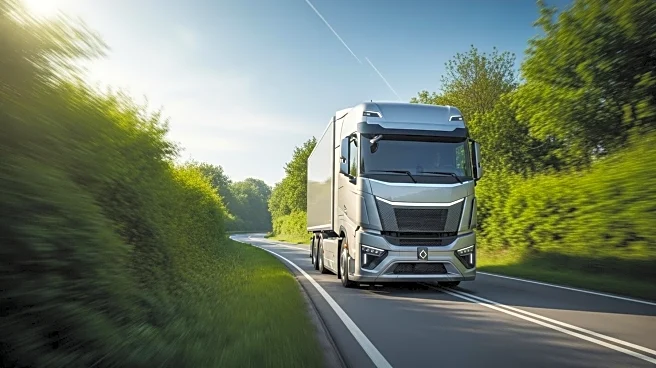What is the story about?
What's Happening?
Einride, a technology company specializing in digital, electric, and autonomous road freight solutions, has successfully operated a fully autonomous heavy-duty vehicle on a public road in Belgium. This milestone was achieved at the Port of Antwerp-Bruges under the Belgian regulatory framework, highlighting Belgium and Europe's leadership in advancing autonomous freight technology. The demonstration involved Einride's proprietary Autonomous Drive Stack, a cabless autonomous truck, and an intelligent fleet management platform. The event underscores the collaboration between public and private sectors in promoting safer, more efficient, and sustainable logistics.
Why It's Important?
The successful deployment of a fully autonomous heavy-duty truck on a public road marks a significant advancement in the logistics and transportation industry. This development could lead to more cost-efficient logistics solutions, as Einride's technology allows for scaling with fewer remote operators per vehicle. The initiative aligns with European ambitions to enhance competitiveness through innovative, safe, and sustainable technologies. It also demonstrates the potential for autonomous vehicles to decarbonize logistics and secure supply chains, which is crucial for economic growth and environmental sustainability.
What's Next?
Following this demonstration, further deployments of autonomous vehicles in Europe and potentially other regions are anticipated. The success in Belgium may encourage other countries to adopt similar regulatory frameworks, facilitating the broader integration of autonomous technology in logistics. Stakeholders, including government bodies and logistics companies, are likely to monitor the outcomes closely to assess the feasibility and benefits of scaling such technologies.
Beyond the Headlines
The deployment of autonomous trucks raises ethical and legal considerations, such as the impact on employment in the trucking industry and the need for robust safety regulations. Long-term, this technology could transform logistics by reducing reliance on human drivers, potentially leading to shifts in labor markets and regulatory landscapes.















